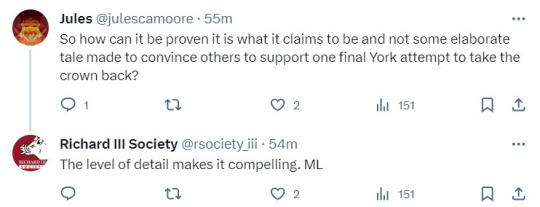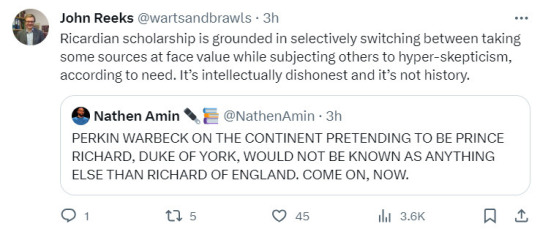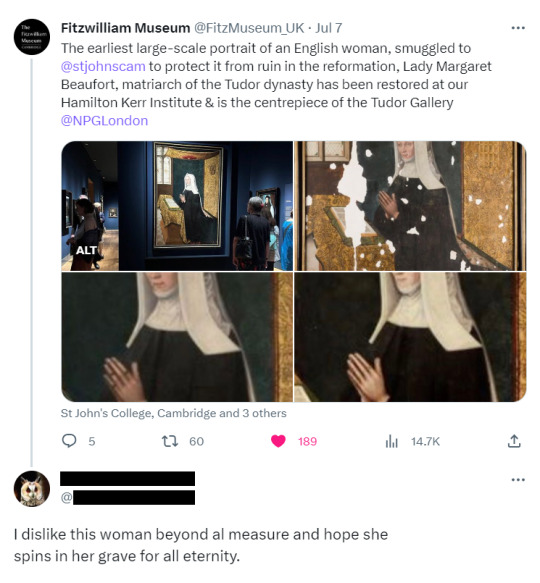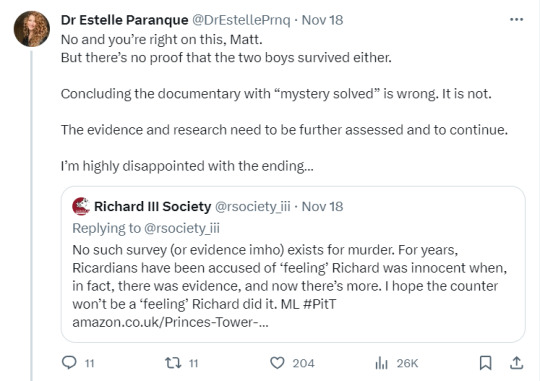#ricardians for ts
Explore tagged Tumblr posts
Note
So what's the new evidence anyway?
Summing up the 'new evidence' about the Princes in the Tower
1. They found Maximilian of Austria's receipt (for the payment of pikes) calling Lambert Simnel Edward IV's son instead of Edward IV's nephew (Warwick) so that would somehow prove Edward V survived. They try to convince us into trusting the word of a ruler who by his own admission in 1488 claimed he was duped by his mother-in-law into supporting a fake prince and then four years later did exactly the same thing again.

2. They also ask us to believe in a survival account provided by Perkin Warbeck because it's so detailed it's 'compelling', but they won't accept the same from Thomas More, for example, regardless of how detailed or how many names are provided in More's account (the good old picking and choosing).

3. They present a 'Richard' signature which is supposedly such a bold statement in itself it could only be the real name of the person who wrote it, as if the man pretending to be Richard of Shrewsbury would ever sign his documents with any other name.

These are truly abysmally poor arguments. It's like John Reeks said: this is not history, this is a PR campaign dashed with a side of intellectual dishonesty. If your argument can't be supported by real solid evidence it's not history, it's wishful thinking.
114 notes
·
View notes
Text
Fuck it let’s see if Daughter of Time really is so good it makes sense it basically spawned half of the Ricardian movement
6 notes
·
View notes
Text
I find baffling how ricardians always manage to detract from genuine criticism by conflating their opponent's arguments with something else entirely.

Their arguments always sound like: Oh you think Richard III killed his nephews, so you are a devotee of Thomas More! So you think Richard was born with long hair, a full set of teeth and a withered arm! And that's when they don't simply say: read the Daughter of Time! As if Josephine Tey was in any way a qualified historian.
and the other reason i have such beef with ricardians and why i think the richard iii society should not be platformed for it is promoted psuedo history is how they react to people who disagree with them
you can't just come to a different conclusion about richard, you have to only develop a negative opinion towards his actions only because of "propaganda" ricardians very often treat historians or anyone who don't like richard as if they have only read the play richard iii and treat it like it's a true account, they bring up that play constantly, it is incredibly bad faith
i frankly also am starting to see this in regards to mary i, and it is inherently anti-intellectual and conspiratorial thinking, it does not belong anywhere near scholarly spaces
23 notes
·
View notes
Text
The Lost King: movie review
TLDR: not as Ricardian as I was expecting, but definitely a Ricardian movie. Enjoyable, but the historical arguments were weak.
I want to grab the makers of this movie and shake them and shout RICHARD III IS AN IMPORTANT HISTORICAL FIGURE AND THEREFORE WORTHY OF FINDING HE DOES NOT HAVE TO BE “THE RIGHTFUL KING” NOR DOES HE HAVE TO BE GOOOOOOOOOOOOOOOOOOOOOOOOOD
My favourite part of the film was Harry Lloyd as the ghost of Richard III. He was just great.
One moment that i loved, being a nerd, was when Philippa goes to a bookshop and asks about books on King Richard III and the woman says “we have 8 titles” “I’ll take them” “which ones?” “all of them.” MOOD.
Given that Philippa Langley was a producer on this movie I was worried they’d portray her as flawless but she felt like a real person rather than a saint. Even Richard’s ghost is like “your interest in me is getting obsessive.”
I also liked the portrayal of ME. It felt like the moviemakers did their homework. The score at times was pretty overpowering and maybe a bit too whimsical.
“Tudor propaganda” this and “Tudor historians” that. This movie never acknowledges that anti-Richard Yorkists existed. Richard wasn’t just brought down by Henry Tudor, he was brought down by a Yorkist-Tudor coalition. Let’s not erase the teamwork of Elizabeth Woodville and Margaret Beaufort!
There is one passing mention of Anne Neville, yaaaaaaay.
I dislike this movie’s implication that anti-Ricardians are ableist or they can’t see past Shakespeare. Ricardians aren’t the only ones reading sources!
Now on to the feeble historical arguments this movie allows to go unchallenged:
“Shakespeare made up the hunchback”.
No. Shakespeare took the idea of Richard’s back and the idea of him having an abnormal birth from Thomas More’s history.
“Richard III wasn’t a usurper but the rightful king! Edward was married to Eleanor Butler! His marriage to Elizabeth Woodville was invalid!”
Even if Eleanor was the ‘true wife’ of Edward IV (and isn’t it convenient that both were dead when Richard argued this?) Edward V was his father’s chosen heir. Edward IV specifically said he wanted Richard to be Protector, not king. If Edward IV wanted Richard to be king or considered him the rightful heir...he could have named Richard. He was the king!
“Richard didn’t kill Edward of Warwick or his nieces or his sister’s seven sons!”
Duh he didn’t. They were behind him in the line of succession! And if Edward of Warwick was technically ahead of Richard in the line of succession.... that means Richard wasn’t actually the rightful king Philippa.
“In Henry VII’s first speech he doesn’t mention the princes’ murder, why? They were still alive!”
That’s a huge leap of logic oml. These two things...just don’t connect.
“Richard III established innocent until proven guilty!” “Richard wanted a more just society”.
We’re really not going to mention the time he had people disembowelled for talking shit about him?
“Richard was an advocate for the printing press when people thought it was the work of the devil”
OK, first of all, Edward IV was Caxton’s patron and early printed works were dedicated to Elizabeth of York so jot that down. Stop acting like Richard was THE innovator here. Also, work of the devil?? What’s the source for that??
“Richard provided the safe strong leadership the country needed”
His coup killed Richard Grey, William Hastings, and Anthony Woodville. With no trial. Then he was on the throne for 2 years, and there were 2 attempts to remove him and the second succeeded. How low are your standards??
Nevertheless, the movie wasn’t as Ricardian as I thought it would be. Philippa asks Richard’s ghost “did you have them killed?” and he doesn’t say no. He simply asks her what she thinks. Also one character says we mustn’t sanctify OR demonise people.
This movie has caused controversy because there’s a character we’re clearly meant to hate called Richard Taylor. He’s patronising, dismissive, and pretty ableist too, so ableist that Philippa calls him out publicly and educates him that “having a disability doesn’t make you evil.”
Unfortunately there’s a real guy called Richard Taylor, and I can see why he’s planning on suing for defamation. This was an easily avoidable problem! Just change the goddamn names, or have some proof that the real Taylor was a dick!
44 notes
·
View notes
Text
Iconic (and ironic) Ricardian claims:
* Dismissing Henry VII’s claim to the throne because it came from his mother’s side, when the Yorkist claim also came from a woman, Anne Mortimer (whose father was heir presumptive to Richard II via his mother Philippa Plantagenet, daughter of Lionel, 1st Duke of Clarence).
* Calling Henry VII a bastard because of his Beaufort blood (something that Richard III himself did during his slandering campaign against Henry) when Richard was also Beaufort by blood thanks to his mother Cecily Neville. Also, twice ironic considering that Richard’s grandfather, Richard 3rd Earl of Cambridge, may have been a bastard.
363 notes
·
View notes
Text
For many in the Richard III Society, including Philippa Langley, Richard’s “hunchback” was a slanderous Tudor invention, and the confirmation of his scoliosis was a blow—even, for Langley, a “personal [. . .] disaster.” The excavation forced Langley and the Society to shift tack, from denying any spinal difference, to insisting that scoliosis would not have actually impaired the royal body. Langley’s excavation account describes scoliosis as a “condition, not a disability,” while the Society’s website stresses the fact that the athlete Usain Bolt also has scoliosis to demonstrate that it “doesn’t necessarily limit physical capability.” This strategy recalls a line from Josephine Tey’s 1951 Ricardian novel The Daughter of Time, in which a detective investigating the murder of the Princes in the Tower speaks to an expert who claims Richard had ‘“no visible deformity. At least, none that mattered.”’ Deformity, disability: all must be minimized, framed as “not matter[ing],” if this Richard is to be claimed by the Ricardians.


More than Richard’s moral reputation is at stake in the Society’s engagement with his skeleton. The Ricardians’ resistance to the idea of a physically impaired Richard relates to an anxiety that a disabled or visibly “othered” royal body would be incompatible with their perceptions of medieval English kingship as muscular, masculine, warlike. Langley’s excavation account characterises Richard and his “era” in terms inflected by nostalgic, romantic medievalism. If Richard was ever harsh, this was simply a product of his being a prince in a “ruthless era;” these qualities, moreover, were balanced out by his considerable martial “fortitude” and “chivalry.” The Society’s Richard is a knight, a pseudo-Arthurian defender of the realm—perhaps, recalling the popular emphasis on Richard’s death in battle, the last real fighting English king.
— Rowan Wilson, Reading the “human braille”: Discourses of Ableism and Medievalism in the Reburial of Richard III
#ricardians for ts#philippa langley#ableism cw#thanks @machiavellianjane for showing me the article!#historian: rowan wilson
119 notes
·
View notes
Text

Mystery also surrounds Owen Tudor's marriage, but there is no question as to its validity or the legitimacy of his offspring. Richard III's proclamations described Tudor as a bastard; his marriage, however, was not disputed.
Ralph Griffiths, "Tudor, Owen [Owain ap Maredudd ap Tudur] (c. 1400–1461)", Oxford Dictionary of National Biography (2004, updated 2008)
#when even richard iii’s own words don’t support your RAnon conspiracy theories lol#ricardians are such profoundly unserious people#ricardians for ts#richard iii
38 notes
·
View notes
Note
There's a part of me that thinks that the reason why Margaret Beaufort isn't all that well-liked in her portrayals in fictional media is partly because she can’t be sexualised.
Oh, absolutely! This is very evident in Gregory's novels where she is described as 'ugly as sin'. We all know the first thing mocking a woman for her appearance does is to single out said woman as particularly inferior, evil and/or undeserving of love and respect. It is, of course, convenient to blame a woman to absolve a man.

Everything about Margaret Beaufort is villainised, even her piety — which is another thing that makes Margaret so difficult to sexualise: there's no evidence that she ever had some great romance. On the contrary, she took a widow's vow of chastity whilst her husband was still alive. In the Gregory-esque logic of thinking, a woman is either beautiful and desirable and good, or ugly and frigid and evil.
131 notes
·
View notes
Text

Average reaction on Twitter.
82 notes
·
View notes
Note
I just read an article on this so called new evidence and I'm not impressed. Maximilian is one of the co-conspirators behind the perkin warbeck situation due to his conflict with Henry vii policies that didn't work to his advantage. Of course he would call warbeck one of the princes that was all part of the plan. What I find hilarious is that these are the same people who say everything thomas Moore wrote is a lie and propaganda ����
It's the same thing they say about Mancini's account of Richard III's usurpation — they say he was a foreigner so he can't be trusted and yet look at them trusting all those *selected* foreign accounts:

Interesting how they choose not to take the testimonies that took place in Portugal where three Portuguese knights confessed they knew Warbeck was an impostor and instead take the most invested foreign ruler who had a skin in the game against Henry VII to base their theory on.
What genuinely makes me mad are the arguments that are so classist in nature they sound so absurd it's incredible anyone buys them. So because those foreign rulers were royal they didn't lie? Because they were royal they couldn't be duped? Because someone wasn't born royal they couldn't learn how to present themselves like royalty, even with training and support?
It's equally ridiculous to take someone's signature at face value, though. I don't know what's more pitiful as 'proof'.
#i'm shocked there are people who were convinced#by 'evidence' that was already around since the 1950s#replies#anon#ricardians for ts
30 notes
·
View notes
Text
[In Philippa Gregory], in contrast with the wholesomeness of Plantagenet land, the usurping Tudors are linked to disease [...] Through her repeated reminders that Tudor forces arrived from Brittany and speculations that they brought a foreign plague, Gregory associates migration with contamination [...] Such organic motifs biologise the polarity of belonging and not belonging. The notion of a ‘Tudor disease’ consolidates Gregory’s conservative sense of a blood and soil nation delineated by exclusive dynastic networks.
Don't you love when unsuspecting history fans parrot a virulent xenophobic and nationalist rhetoric? Never mind that the sweating sickness was reported in England before Henry VII landed with his army, never mind that we don't know if Arthur died from the sweating sickness, our interpretation of history must always be contextualised according to the cultural imagination of the present, and OP fell right into current conservative, blood supremacist and anti-immigrant views.

#honestly a bit of self-awareness would be good#this is actually a very offensive rhetoric#ricardians for ts#but there are people who repeat that kind of stuff#and aren't even ricardians so!#do better
68 notes
·
View notes
Note
I haven't read much about the princes in the tower, so I'm not experienced to say much about those events. But from what posts I've read about the apparent new evidence, I'm assuming it wasn't very helpful to actually figure out what happened to them.
Is it accurate to what people have managed to figure out so far?
Hi! I don't think I quite understand your question, but I'll try to answer it (sorry!). No one knows what happened to the princes (actually prince and king, one of the boys was Edward V). Although no evidence so far proves that they died around 1483-1485, no evidence proves that they survived either. I summarised their 'new' findings here (x) but what I can say about it is that I've seen no serious historian consider them as evidence of their survival because you actually have to believe that people who had vested interests in controlling England for their own political gain would be 100% honest and upright about supporting alternative candidates to the English crown.



#ask#sorry i don't know if that was the kind of answer#you were looking for#ricardians for ts#the princes in the tower
11 notes
·
View notes
Note
Hi! This is probably going to sound very rambly but I'm really confused and my thoughts are all over the place
The Ricardian xenophobia and anti-Welsh prejudice against Henry VII's ascension is so sickening to see, but it's also ... extremely baffling? In my opinion, there's no other reason it could have originated other than Ricardian double standards.
Because..the Yorkists *also* had Welsh heritage. Edward IV emphasized his Welsh lineage as much Henry VII did and much earlier (highlighting his descent from Llewellyn, utilizing the prophecies of Cadwaladr and the struggle between the Red and White Dragon, etc). The first Welshman to be ennobled since Owain Glyndwr’s fight for freedom (William Herbert) was during his reign, and the fact that very few Welshmen bothered to obtain letters of denizenship during that time (literally *one* person from 1467—1483, and while one is obviously still too many, it's a significant drop from his predecessors and should absolutely be noted in a positive way) is a clear indication that he did not make much use of the Penal Code. Which is a good thing, obviously! Yet for some reason, this is conveniently ignored, even though we know for a fact that David Powel believed that Henry VIII’s Welsh heritage was from his mother Elizabeth of York rather than his father.
The Yorkists *also* had Irish heritage through Elizabeth de Burgh, Countess of Ulster & wife of Lionel of Antwerp, which is also conveniently ignored for ... reasons.
And the comparison between Elizabeth of York’s “English Plantagenet blood” versus Henry VII’s “Tudor blood” which I have seen from some Ricardians is so bizarre to me. Apart from her Welsh and Irish connections through her father as discussed above, Elizabeth of York’s grandmother was from Luxemburg. Her grandfather began his career as a simple English knight. The Woodvilles, as usual, are simultaneously vilified and entirely disregarded when talking about the supposed "end of the Plantagenets.
So like...I'm a little confused WHY people assume that Henry VII's ascension heralded this massive change in terms of nationality or bloodline? Like you mentioned, he was also directly descended from Edward III. His grandmother was the Queen of England, his uncle was the King of England and his mother was one of the wealthiest English heiresses of her time. And Owen Tudor was given letters of English denizenship after his marriage to Catherine of Valois, which would have passed to his sons and grandson.
Of course, when talking about the Plantagenets/Yorkists, I mainly focused on Edward IV and his children, which probably why it's barely taken into account. When people fantasize about the so-called “purity” of the Plantagenets and Yorkists, they’re mostly (99.9% of the time, tbh) talking about Richard III, the emblem of "Englishness" (🤮) in the Victorian era and other eras (although he's certainly not the only one - Henry V, Henry IV to an extent, Edward III, Richard Lionheart and Henry II are all viewed in a very similar way), and mindlessly swallowing Richard’s own propaganda again Henry VII.
(While this isn't completely related, I wouldn't feel comfortable sending this ask without it so I hope it's okay and it doesn't get too long. To be honest: the Tudors are ALSO seen as symbols of English nationalism by an overwhelming majority. They are probably the most famous and well-known English dynasty; a vast number of English history books literally start with the year 1485; the red-and-white Tudor rose is one of the most memorable symbols of the English monarchy; and a vast number of people view that era as the "golden age" of England; Henry VIII and Elizabeth I Tudor are probably the most well known English monarchs of all time. So I certainly don't feel comfortable believing that there's a one-sided negative view against them because that's objectively not true; they're seen in a very positive manner by the vast majority of people. Which is why the contrary claims are so confusing to me - they're so vehement, but they also make no sense whatsoever, and they're completely opposite from the positive and glorified view that - overwhelmingly imo, at least internationally - opposes them)
Sorry if any of this isn't framed properly, English isn't my first language. I can send an ask to clarify anything it it's too confusing to understand 😅
Hi! Sorry for taking so long to reply! I must admit that I lost you there in the end (sorry) but I think I got the gist of your ask. There are a couple of views regarding the 'Welshness' of the Tudors. Some people disregard it entirely because of the things you said by the end of your ask: Henry VIII's break with Rome and Elizabeth I's triumph against the Spanish invasion/armada have been regarded as hallmarks of the making of British (and by British, read: English) culture, as much as Henry V's fight against the French, for example. Of course, Henry VIII and Elizabeth I were not (culturally at least) Welsh, so I would find it equally weird to claim that 'Welsh' was the defining Tudor trait.
As Dr Adam Chapman highlighted in this podcast episode, there was no such thing as 'Wales' as a well-defined country. Welsh identity was cultural, political and based on language. What made Henry VII Welsh was not some x-times removed ancestor, but the fact that he spent his formative years 'in the most Welsh place imaginable' (William Herbert's household), that he most likely spoke Welsh, famously enjoyed Welsh culture (Welsh mead, Welsh music, openly promoted the cults and celebrations of Welsh saints such as Saint David & Saint Armel), promoted Welsh servants, and the fact that he was embraced as Welsh by the Welsh themselves.
But mostly, I think many people do not know that the Tudors were originally Welsh at all! Mostly, people who bemoan that aspect — even if, technically, only one Tudor monarch was Welsh — are the ones who like to romanticise Richard as the last true bastion of Englishness such as Philippa Gregory, Rosemary Jarman, John Ahsdown-Hill, Sandra Worth etc. It is ironic, as you said, because the Yorkists also had Welsh heritage, and when push comes to shove you'll find plenty of ricardians saying Richard was 'more Welsh' than Henry VII because of some ancestor x-times removed, even though Henry had a Welsh grandparent, was born in Wales, was raised in Wales, and grew up in a Welsh-speaking household where Welsh cultural traditions were held. Apparently, being Welsh is terrible unless it's time to say Henry VII was fake Welsh or was less Welsh than the Yorkists.

(never mind that Henry VII was also descended from Llewellyn the Great)

(also stupid because Henry VII never claim to be descended from King Arthur)
It doesn't matter if they don't consider Henry VII to have been very Welsh (or Welsh at all) because suddenly being Welsh is too cool for such an uncool guy like Henry Tudor. The Welsh people of his time viewed him as Welsh. He had all the right conditions to compete for the prophetic mab darogan title as explained here, and that's something considering a part of the Welsh people had been willing to accept even the Yorkists for the title at the time they were against the Lancastrian crown. Edward IV explored that advantage on some occasions, especially when it came to legitimising his rule via prophetic discourse.
However, as stated by Gruffydd Aled Williams, if Edward IV 'did not excite overmuch enthusiasm among the Welsh bards' (in the number of poems produced), it seems like Richard did not even come close to that. It's not that we find very few poems praising Edward's brother (I wonder if there are actually any), it's that the Welsh poets were especially harsh on Richard — he was compared to King Herod (who ordered the killing of the first-born sons), and called unchristian names such as 'saracen'. He was also called ableist names such as 'little Richard', 'deformed Richard', 'little raider', 'small Richard', 'feeble-bodied', 'little ape' and so on. From 1483 onwards, the bards who once had their loyalties divided between Jasper Tudor and Edward IV/William Herbert, unanimously united in Henry Tudor's favour.
Again, cultural identity mattered a lot, which seems to be conveniently forgotten when they decide that it's actually cool to be Welsh. Most of the time they don't seem to see it as good quality, though. The aspect of cultural identity matters when they like to explore the idea that the Tudors were not culturally English, so they didn't know and respect English traditions. It's not uncommon to see the claim that Chilvary died with Richard at Bosworth — Sandra Worth's “at Bosworth Field died the Age of Chivalry” — as if Henry VII didn't extensively engage with chilvaric performance (x, x) and discourse (x).
In my opinion, the real problem with this kind of discourse and re-imagination of the past is, of course, the very real anti-immigrant and English nationalist sentiment that has gained so much currency in Brexit-era England. Henry VII & his family are dead, they can't be offended by any of that — the immigrants who are associated with diseases according to that kind of rhetoric, for example, are not.
23 notes
·
View notes
Note
Sometimes i think i' m going crazy. Before Richard was found fans denied forever he had skeleton problems, he was completely normal and his back issues was evil tudor propaganda. Whole movement was built on it, extreme hostility to it. They find him, all the above just disappeared, like it never existed. So before that hunchback rumors (how they called it when it "nasty lies") was disgusting and made up. Now they are weird and welcome scoliosis (how they call it now so he sounds medical and not scary). But the framing, from a horrible thing to say, to now an unfortunate condition he beat, upsets me. Its so manipulative. so now he's more cool because he did really awesome things coping, when they used to hate the idea he had it! And so tudors hated him bec they were "ableist" when it used to be they invented it! But I'm just hoping other people see it and get as mad as me
Hello! I received this ask several months ago but it got buried in my inbox (I'm so sorry). You're not alone in your observation. Rowan Wilson pointed out how the Richard III Society and its members went from completely denying any physical difference to admitting Richard's scoliosis but brushing over any possible disability.
Don't get me wrong, the Tudors and Richard's contemporaries (we find comments on his scoliosis from before his death) were absolutely ableists when they singled out Richard's scoliosis as a visual mark of his reign and character. But so too was denying any chance of disability because that would not make him the warrior they equate with good medieval kingship. Do you get what I mean?
10 notes
·
View notes
Note
Oh my god, KW is absolutely like that these days too, I used to be mutuals on Facebook with her. She's gone completely off the rails because she only listens to people who tell her she's the only good medieval historian working today and the only one who consults primary sources (their basis for comparison being other shitty pop historians, shitty novelists, and random people in comments sections who mention hot pokers). She's also super obsessed with the idea that Edward II wasn't actually porking Hugh Despenser but Hugh's wife, who was also HIS NIECE (and his dependence on Hugh was because...blackmail?) but people aren't open-minded about that or something. I expect she'll go full "no homo" any day now. She had the chops at one point to write decent scholarly history, with a good editor and peer review, but she's since disappeared right up her own ass.
(Also her narrative style is really smug, she gets easily distracted by listing genealogies of people that her central figure met one time, and she's really dismissive of other historians, even the real ones. Basically her early stuff is okay but by and large she sucks. Ian Mortimer also sucks, but we knew that)
HEY. i wanted to ask you what you thought of Kathryn Warner as a historian?
I haven't personally read enough of her work to have a particular opinion on her narrative style or use of sources, but I know that she is a big member of the Ian Mortimer Club in re: Edward II, wherein they basically act like all historians who don't accept their Superior and Enlightened Theory about him secretly not dying in 1327 are total idiots who shouldn't even be given the time of day. (Mortimer himself is infamous for being a dick about this, and he wrote the forward to Warner's biography of Edward II, so yeah.) And yes, all historians have pet theories and speculations and niche hypotheses with varying levels of support or textual evidence, but if you constantly insist that yours is the Only Correct Reading and everyone else is just unwilling to appreciate your genius, that's not really a healthy attitude.
If you're an academic historian, you have to be open to constructive criticism, you have to be willing to read and interpret sources in multiple ways and to acknowledge the obvious fact that we don't know everything and are working with limited and subjective sets of evidence, and since the actual proof for Edward II's supposed not-death in 1327 is flimsy and circumstantial at best, it strikes me as being in the same vein as the Richard III apologists (such as the ones discussed earlier this year) who try everything to "prove" that he didn't actually kill the Princes in the Tower. If lots of other people have examined the same evidence and don't necessarily agree that it supports your position, given that old "extraordinary claims need extraordinary evidence" rule of thumb, it doesn't mean that obviously you're right and they're just wrong and stupid. Instead, it means (at the least) that you need to take a better look at it yourself. But since people like the Ricardian Society and all the other Plantagenet-era revisionist historians have staked their entire careers on "proving" the experts wrong (even if they never actually do), they don't do that.
In short, if that kind of challenge happens to you, you could (and should) at least admit the possibility that your pet theory, or even just some parts of your pet theory, might be wrong, instead of doubling down all over again. If you don't do so, it becomes difficult to trust that you're actually interpreting other evidence correctly, or that I myself would do the same if I looked at it independently. If you're tying your entire identity as a scholar to one controversial argument, which you are in the distinct minority about making and which you won't accept any criticism of, ever, then you get relegated, at least in my mind, to the more conspiracy-theorist, contrarian lower level of historians, rather than people participating in serious and well-grounded academic practice that actually does want to exchange and engage ideas in good faith. That may or may not be totally fair of me, but still.
To some degree, all history is obviously "revisionist": there is not one solid and unquestionable narrative of "what really happened," and if you make your argument well, almost all good scholars are willing to accept it and to use it to critically update common narratives or widely accepted beliefs that may no longer be accurate. After all, nobody wants to be the idiot who's still citing something 30 years out of date, if the peer review process has produced something better and more relevant. But if your ideas have repeatedly been rejected by said peer review process, and you haven't modified them at all and just hurl insults at everyone who doesn't appreciate your genius, then yeah, you're not contributing to any of that, and people are justified in not really taking you seriously. This is directed more at Mortimer than Warner, but as she's in the same group, it does apply to her as well.
#then there's her bullshit theories about joan of kent's marriages#god she's so terrible#incest for ts#she is also the sort of historian who cares about social issues only insofar as they affect her faves#ugh just ugh#oh she's also buddy-buddy with one of the biggest ricardian cranks so there's that
23 notes
·
View notes
Note
I was wondering what the tag Ricardians for ts means?
I’ve seen it a few times, however I haven’t been able to figure out what it means. You wouldn’t mind please telling me what it means, would you?
Hello! 'for ts' is an old tumblr expression for tagging content that might be annoying or triggering — 'for ts' literally means 'for tumblr savior', a tool to hide posts which contain certain words or phrases once you have them saved in your settings (like you can do on XKit). I tag ricardian discourse as 'ricardians for ts' so people who are not interested in the discussion or are annoyed by it can have their eyes spared. It's simply an old tagging convention on tumblr for aiding people who want to avoid certain content.
3 notes
·
View notes